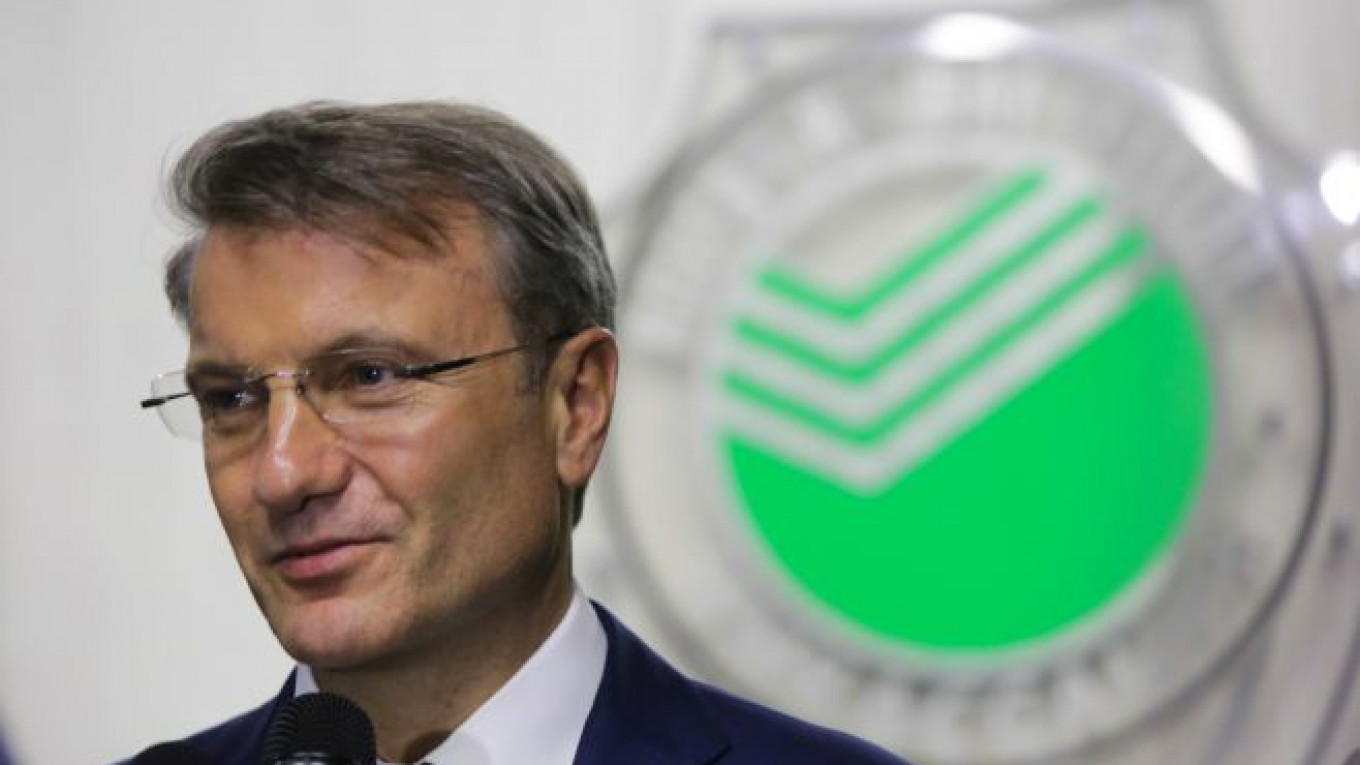Russia's biggest lender Sberbank plans to keep its dividends at no less than 20 percent of net profit for the next five years after forecasting 2014 profit on par with last year's earnings despite a worsening economy and the Ukraine crisis.
The situation in Ukraine after Russia's annexation of Crimea has had a detrimental effect on Russia's already slowing economy, with zero growth now expected this year.
The economic decline prompted Sberbank to increase bad loan provisions in the first quarter, delivering an 18 percent fall in earnings from the same period last year. Full-year net profit for 2013 was 362 billion rubles ($10.4 billion), up 4 percent on 2012.
"No one could have predicted Ukraine. No one could have predicted East Ukraine in the way it is happening now," Deputy Chairman Alexander Morozov said at the bank's annual shareholder meeting.
"[But] we aren't changing our business plan, which was adopted in December, before Ukraine. We expect our profit this year not to be below last year."
Yet the financial impact of the crisis remains inescapable.
"The effect caused by the Ukraine crisis was significant, not the sanctions per se, but the situation with the deterioration on the financial markets," Sberbank's CEO German Gref said.
Western sanctions applied against a number of people and entities deemed close to President Vladimir Putin has increased the burden on lenders dramatically, Gref said, causing a liquidity squeeze that will push up lending rates.
He said Sberbank is in talks with Russia's Central Bank to find ways to relieve the situation.
Gref added that the bank had made no decision on whether it would participate in a government plan to support banks.
Putin promised at a recent investment forum that the government would help systemically important banks by allowing them to convert subordinated loans into shares, allowing them to boost their capital positions and free them to lend more.
Payout Policy
In spite of the difficulties faced by the bank, Deputy Chairman Morozov said it would pay out at least 20 percent in dividends over the coming five years and the new dividend policy will be approved before the year's end.
In Sberbank's 2011 dividend policy, the bank said it would increase dividend payments to up to 20 percent of net profit over the course of three years. It reported dividends of 15 percent in 2011 and 17 percent in 2012 and said it would pay out 20 percent of profit in 2013.
Gref also reiterated that the bank wants to remain in Ukraine and that it is looking to sell its local network of branches in Crimea.
He was quoted by news agency Interfax as saying that he would ensure that a successor would be ready to take over if he steps down at some point, but insisted at a press conference after the shareholder meeting that he is not preparing to leave and has 18 months left on his contract.
Sberbank has a company rule that all senior employees should identify two potential successors, Gref said.
"I'm not preparing to go anywhere," he said. "For all key positions there should be successors. It's a normal, civilized corporate standard. For the next one-and-a-half years I have a contract. From then it will become clear."
A successor would not necessarily come from within Sberbank, said Gref, who has been CEO since 2007 and has been credited with modernizing the bank from its Soviet roots. Previously, he was Russia's Economic Development Minister.
A Message from The Moscow Times:
Dear readers,
We are facing unprecedented challenges. Russia's Prosecutor General's Office has designated The Moscow Times as an "undesirable" organization, criminalizing our work and putting our staff at risk of prosecution. This follows our earlier unjust labeling as a "foreign agent."
These actions are direct attempts to silence independent journalism in Russia. The authorities claim our work "discredits the decisions of the Russian leadership." We see things differently: we strive to provide accurate, unbiased reporting on Russia.
We, the journalists of The Moscow Times, refuse to be silenced. But to continue our work, we need your help.
Your support, no matter how small, makes a world of difference. If you can, please support us monthly starting from just $2. It's quick to set up, and every contribution makes a significant impact.
By supporting The Moscow Times, you're defending open, independent journalism in the face of repression. Thank you for standing with us.
Remind me later.






